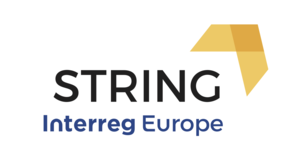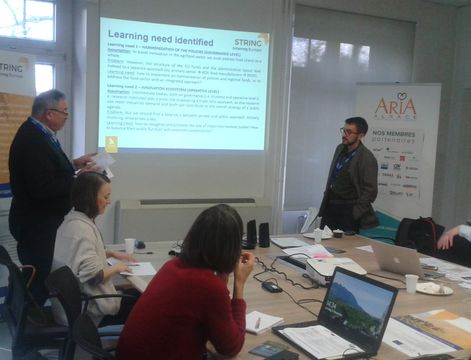Do you know that agrifood clusters prosper in those European regions where they are effectively positioned in the center of regional development programmes? Maybe this looks sound and simple, but it isn’t. Particularly malfunctioning (regional) policy instruments throw sands into the works of strong agrifood clusters and their economic-societal impacts, like employment and liveliness. That’s why seven European regions work together on solutions in a brand new project STRING.
Every regional governor and ambassador present at the launching event of STRING in Bologna (Italy) confirms it: the shared bottlenecks of agrifood innovation systems and clusters need to be solved. Starting with regional development programmes, value chain promotion campaigns and cross-sector hybrid clusterization as the engines for success. Simona Caselli (Regional Minister of Agriculture Regio Emilia Romagna, Italy) states: “In our region we focus on a quality approach in cooping with what consumers ask from us. In that approach innovation and sustainability are important and we hope to benefit from the knowledge and experiences of other regions on these themes within the STRING project and on the other hand to share our knowledge on added value with the programme partners“.
The provision of smart, healthy and sustainable food is a top priority in Europe. The liveliness and dynamism of some European regions depends on the activity of their agrifood sector. STRING boosts the competitiveness of agrifood innovation clusters through intensive interregional learning, knowledge exchange and intercluster cooperation. Pieter de Boer (Project leader from the Province of North Brabant, the Netherlands) says: “In the first phase of the project we focus on knowledge exchange and research on various ways to collaborate and innovate. This leads to the development of adjustment of (regional) policy instruments that support regions to boost their innovation and improve their economic-societal impact”.
Anne-Marie Spierings (Regional Minister of Agriculture Province North Brabant, the Netherlands) states: “We really look forward to collaborate with the partners in STRING. In our province we are good in producing commodity products in large quantities with clean, efficient and sustainable production methods. What we want to learn is how to create added value for our products and to innovate and create new business in cooperation with the health and high tech sector.
As a result in the near future the performance and implementation of regional operational programmes and funds related to agrifood innovation and clusterization are improved. Cluster cooperation is deepened serving the proper operation of food innovation value chain. And strategies for creating added value are adopted and successfully applied via (new) food innovation projects in collaboration with other economic activity, like health care and high-tech systems. Danish entrepreneur Michael Mohr Jensen (owner of organic farm Herrens Mark) experiences the advantage of competitive agrifood clusters in his daily businesses: “Being part of the regional agrifood cluster enabled us to speed up our research and development of new food supplements based on red clover. With the support of regional funds we were able to finance the scientific studies proving the effect of the supplement on menopause complaints and bone density and speed up the sales in Denmark and other countries and of course growth of the company”.
STRING gets supported by Interreg Europe. This is the policy learning programme for public authorities. Interreg Europe helps regional and local governments across Europe to develop and deliver better policy. By creating an environment and opportunities for sharing solutions, we aim to ensure that government investment, innovation and implementation efforts all lead to integrated and sustainable impact for people and place.
Also improving the capacity of your agrifood cluster?


